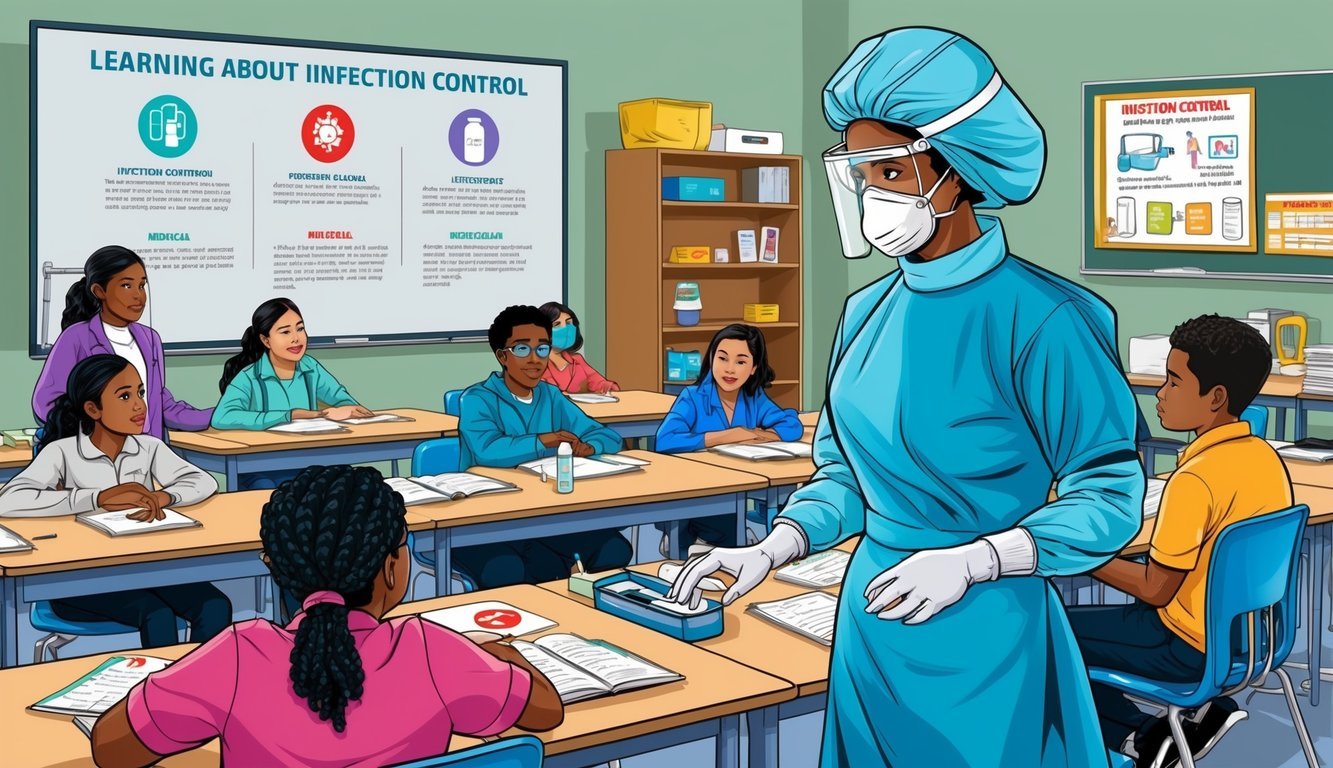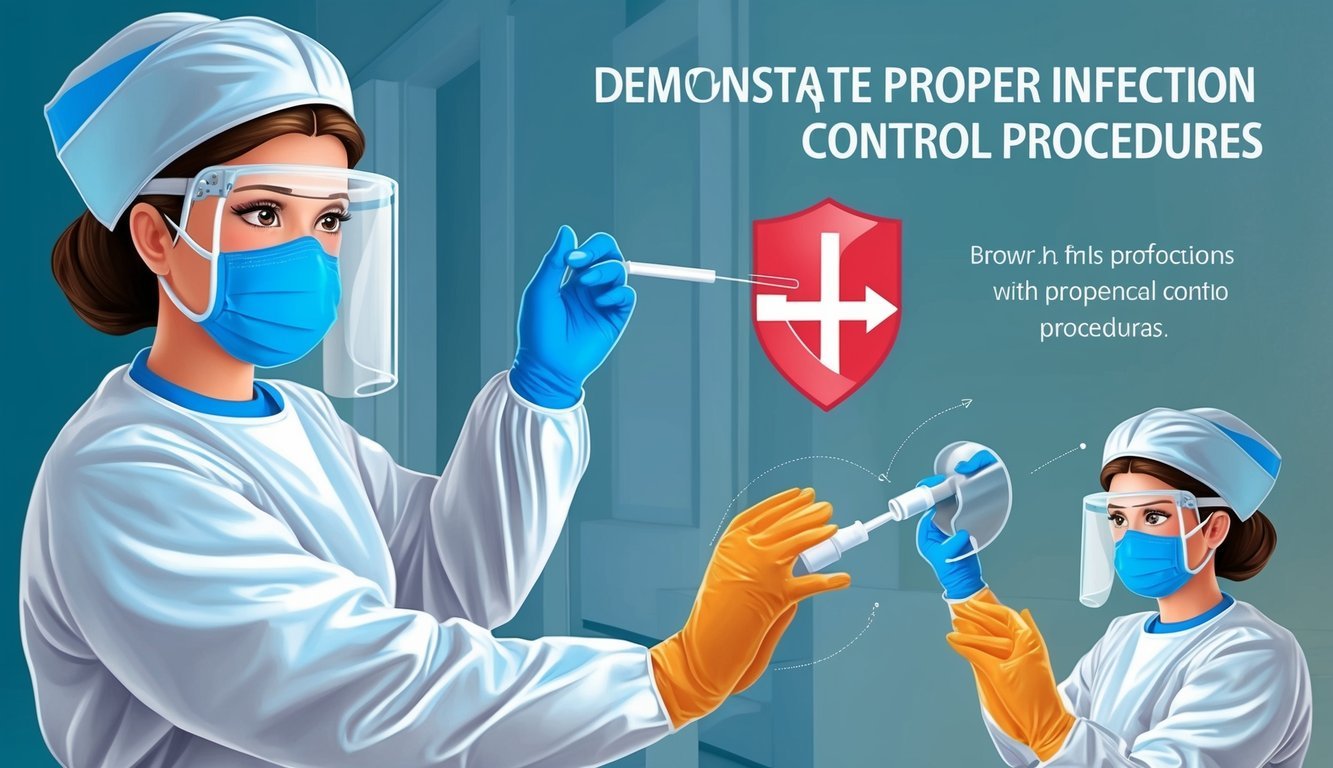Infection control nurses play a crucial role in healthcare settings by preventing and managing the spread of infections. Their work not only protects patients but also ensures the safety of healthcare workers and the community. If you’re considering a career in nursing or are curious about this specialty, understanding the responsibilities and skills required can help you make informed decisions.
To become an infection control nurse, you generally start as a registered nurse (RN) and then pursue additional training and certification.
This specialized field focuses on implementing effective infection prevention protocols and educating others about best practices.
You will find that the need for skilled infection control nurses continues to grow, especially with ongoing public health challenges.
This article will explore the essential roles of infection control nurses, the educational pathways you need to follow, and the challenges faced in this vital healthcare sector.
By the end, you will have a clearer picture of what it takes to excel in this rewarding career.
Key Takeaways
- Infection control nurses are essential for preventing disease spread.
- Certification and ongoing education are key for success in this field.
- The demand for infection control expertise is increasing in healthcare settings.
Role and Responsibilities
As an infection control nurse, you play a crucial role in maintaining safety within healthcare settings.
Your work involves various responsibilities that focus on preventing the spread of infections and ensuring the health of both patients and staff.
Infection Surveillance
Infection surveillance is one of your primary duties.
This process involves monitoring infection rates and identifying outbreaks.
You collect and analyze data to understand infection trends.
Key tasks include:
- Tracking hospital-acquired infections (HAIs)
- Identifying infection sources
- Reporting findings to healthcare teams
Through effective surveillance, you help pinpoint risks and assess the effectiveness of existing infection control practices.
This data informs necessary changes to improve hygiene practices and disease prevention methods.
Policy Development and Implementation
You are responsible for developing and implementing infection control policies.
These policies are essential to ensure compliance with public health regulations and standards.
Your duties involve:
- Creating guidelines for infection prevention
- Updating protocols based on the latest evidence
- Collaborating with healthcare professionals
By formulating clear policies, you strengthen infection prevention strategies within your facility.
Effective policy implementation promotes a culture of safety and reduces infection risks in healthcare settings.
Education and Training
Education and training are vital parts of your role.
You instruct staff and patients on infection control practices to enhance overall hygiene.
Key components include:
- Conducting training sessions for staff
- Providing resources for infection prevention
- Offering patient education on safety measures
Your efforts ensure that everyone understands the importance of hygiene and disease prevention.
Well-informed staff and patients contribute to lower infection rates and a safer healthcare environment.
For more on training resources, visit Infection Prevention Training.
Education Pathways

To become an infection control nurse, you need a solid educational foundation and specialized training.
This includes obtaining a nursing degree and pursuing certification to enhance your knowledge and skills in infection control.
Undergraduate Education
You begin your journey by earning a nursing degree.
This can be an Associate Degree in Nursing (ADN), which typically takes two to three years.
Alternatively, a Bachelor of Science in Nursing (BSN) is a four-year program that provides in-depth training.
Once you complete your degree, you must pass the NCLEX-RN exam to become a registered nurse.
This is a crucial step in your career.
The BSN program often covers topics like public health and infection control, which are vital for this field.
Having a BSN may provide better job opportunities and advantages in advanced practice roles.
Certification and Continuing Education
After gaining experience as a registered nurse, you can pursue certification in infection control.
The Certification Board of Infection Control and Epidemiology (CBIC) offers the Infection Control Nurse Certification.
To achieve this, you must meet specific eligibility requirements and pass the Certification Exam.
Continuing education is essential to keep your knowledge current.
Participate in workshops, seminars, and conferences focused on infection prevention.
These opportunities help you stay updated on best practices and guidelines.
Many facilities may require ongoing education credits to maintain your certification, ensuring that you are always informed about the latest developments in infection control.
Essential Skills and Competencies

As an infection control nurse, you need a mix of clinical skills and effective communication.
Balancing technical knowledge with the ability to convey information clearly is crucial in preventing and managing infections.
Clinical Expertise in Infectious Diseases
You must have strong clinical expertise in infectious diseases.
This includes understanding microbiology and recognizing various pathogens.
Knowledge of infection control protocols is essential for managing outbreaks and ensuring safety.
You should also be familiar with infection prevention and control (IPC) strategies.
This involves implementing effective hand hygiene practices and the proper use of personal protective equipment (PPE).
Monitoring and analyzing infection data are key skills for identifying trends and risk factors.
Engaging in quality improvement initiatives helps create better health outcomes for patients.
Always stay updated on emerging infections and changes in guidelines.
Communication and Project Management
Effective communication skills are essential in your role.
You need to educate team members and patients about infection control practices.
Clear communication can help reduce misunderstandings and ensure adherence to protocols.
Project management is another important skill.
You may need to coordinate training sessions or manage infection surveillance projects.
Having strong organizational skills helps you handle multiple responsibilities efficiently.
Utilize tools like charts or checklists to improve monitoring processes.
Regularly update the team on infection data and prevention efforts.
This transparency promotes teamwork and compliance with infection control measures.
Employment Landscape

The employment landscape for infection control nurses is diverse, with various healthcare environments offering opportunities.
Understanding the different facilities and advancement options helps in navigating your career effectively.
Healthcare Facilities and Job Opportunities
Infection control nurses find jobs in various settings, including:
- Hospitals: These facilities offer the most opportunities. Here, infection control nurses help prevent outbreaks in critical care environments.
- Long-Term Care Facilities: These places focus on protecting vulnerable populations, making infection prevention essential.
- Ambulatory Care Centers: As outpatient services expand, nurses are needed to ensure safety standards are met.
The average salary for an infection control nurse is about $87,000 per year, with variations based on experience and location.
You might earn more in specialized areas or larger hospitals.
For example, outpatient care centers may offer higher pay than skilled nursing facilities.
Career Advancement and Specialization
Your career as an infection control nurse can lead to various advancement opportunities.
You may choose to specialize as an Infection Preventionist, focusing solely on infection control strategies.
Continuing education can enhance your qualifications, helping you move into managerial roles.
Many hospitals require certifications in infection control for leadership positions.
Networking through professional organizations, such as the Association for Professionals in Infection Control and Epidemiology (APIC), can open doors to new roles and training opportunities.
A strong professional network is valuable for learning and job opportunities.
Trends and Challenges in Infection Control
Infection control is a dynamic field, especially in light of recent global events.
You may encounter various trends and challenges that shape this area.
COVID-19 Impact
The pandemic has accelerated infection control measures.
It’s crucial to stay updated on best practices and guidelines to manage outbreaks effectively.
Learning from the COVID-19 experience can improve future responses.
Healthcare-Associated Infections (HAIs)
HAIs remain a significant concern in healthcare settings.
To combat this, you should focus on implementing strict hygiene practices and monitoring infection rates.
Regular training for staff is key to minimizing these risks.
Antibiotic Stewardship
With rising antibiotic resistance, managing antibiotic use is vital.
You must ensure that antibiotics are prescribed only when necessary.
This approach helps preserve their effectiveness for future patients.
Communicable Diseases
Routine surveillance of communicable diseases helps in early detection.
You should be aware of local disease trends to tailor your infection control strategies accordingly.
Outbreak Management
Effective outbreak management requires a well-prepared plan.
You need to develop response protocols that include rapid communication and containment measures.
Utilize resources like the CDC for guidance on outbreak responses.
Frequently Asked Questions
Infection control nurses play a vital role in keeping healthcare environments safe from infectious diseases.
Understanding how to become certified, the responsibilities involved, daily activities, and essential skills required for this position can provide valuable insight for those interested in this career.
How can one become certified as an infection control nurse?
To become certified as an infection control nurse, you need to follow specific steps.
First, you should complete an accredited nursing program, such as an ADN or BSN.
Next, you must pass the NCLEX-RN exam and obtain your nursing license.
After gaining experience in infection control, you can pursue certification through organizations like the Certification Board of Infection Control and Epidemiology (CBIC).
What are the primary roles and responsibilities of an infection control nurse?
Your primary roles include preventing, detecting, and controlling infections in healthcare settings.
This involves developing infection prevention protocols, conducting education sessions for staff, and monitoring compliance with health regulations.
You are also responsible for investigating outbreaks and reporting them to health authorities.
What daily activities does an infection control nurse undertake?
Daily activities vary but typically include assessing infection trends within the facility, reviewing sterilization and disinfection procedures, and ensuring proper hand hygiene practices among staff.
You may also conduct training sessions and collaborate with other healthcare professionals to address infection-related issues.
What specialized skills are required for an infection control nurse?
Key skills include strong analytical abilities to assess data and detect infection patterns.
Effective communication skills are essential for educating staff and patients.
You should also have attention to detail for monitoring compliance with infection control standards.
Problem-solving skills are necessary for developing effective strategies to prevent the spread of infections.
What are common infection control practices that nurses should follow?
Some common practices include adhering to strict hand hygiene protocols, using personal protective equipment (PPE), and ensuring proper sterilization of medical instruments.
Regular training on infection prevention techniques is also vital, along with promoting vaccination among staff and patients to prevent outbreaks.
What principles guide effective infection control in a healthcare setting?
Principles such as standard precautions, transmission-based precautions, and environmental controls guide effective infection control.
Understanding how infections spread helps you implement strategies to minimize risks.
Regular assessments and updates to protocols based on current research and guidelines ensure continued effectiveness in infection control.

